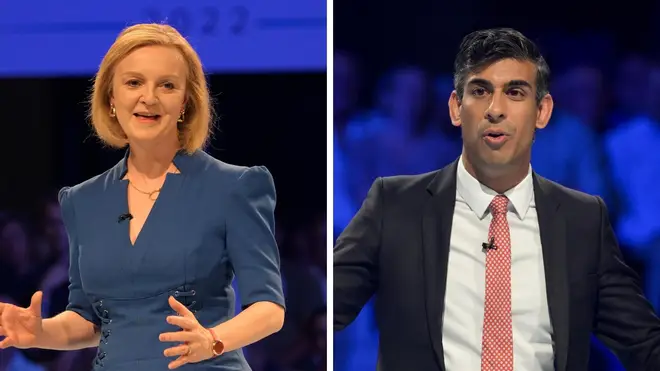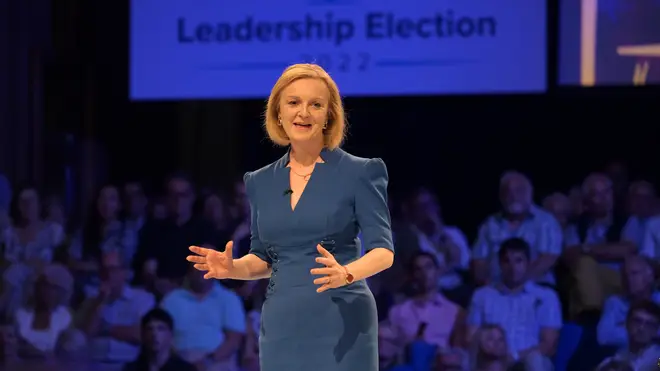
Nick Ferrari 7am - 10am
3 August 2022, 00:00 | Updated: 3 August 2022, 06:07

Tory leadership hopeful Liz Truss has widened her lead over rival Rishi Sunak despite being forced to U-turn on her controversial plans to cut the pay of public sector workers.
On Tuesday Ms Truss was forced to abandon a major policy barely 12 hours after it was launched, following a revolt from senior Conservatives who warned it would be "levelling down" the nation.
The foreign secretary had proposed to save money on Government employees by introducing regional pay that could see staff who live in cheaper places than London and the South East paid less.
Her Tory leadership rival Rishi Sunak and Labour savaged it, claiming it would slash pay for nurses, police and military personnel.
The Foreign Secretary insisted her policy had been "misrepresented", amid growing blue-on-blue attacks, and argued people had been "unnecessarily worried" about cuts as she confirmed she would not be going ahead with the regional pay boards.
Read more: Liz Truss rapidly U-turns on £9bn public sector pay cut after rivals tear plans to shreds
Read more: James O'Brien reacts to Truss's 'pathetic and bigoted' suggestion she'll 'ignore' Sturgeon if PM

Truss' plans were the 'antithesis' of levelling up
Despite the backlash her initial plans received, the Tory leadership frontrunner had reason to celebrate on Tuesday, as a YouGov poll of Conservative Party members showed her lead over rival Rishi Sunak has increased to 34 points.
The YouGov poll shows 60% of the party members polled between July 29 and August 2 say they intend to vote for Ms Truss, the Foreign Secretary, up from 49% in the period July 20 to 21, which was immediately after the final two were announced.
Meanwhile, support for the former chancellor has dropped in the poll, from 31% to 26%, over the same period.
The rest of the Tory members polled say they are currently undecided or will not vote.
Ms Truss, widely seen as the frontrunner to take over in No 10, had announced the move on Monday night as part of a "war on Whitehall waste" to make savings from the Civil Service.
But the Sunak campaign argued that the plan would slash the pay of nearly six million public sector workers, with nurses, police and armed forces members facing £1,500 of cuts.

Government don't have easy choices to make on public sector pay
Speaking to the BBC in Dorset, Ms Truss said: "I'm afraid that my policy on this has been misrepresented. I never had any intention of changing the terms and conditions of teachers and nurses.
"But what I want to be clear about is I will not be going ahead with the regional pay boards, that is no longer my policy.
"I'm being absolutely honest, I'm concerned that people were worried, unnecessarily worried about my policies and therefore I'm being clear that the regional pay boards will not be going ahead."
Mr Sunak's camp argued that the move was no mistake, saying that Ms Truss had called for the move when she was chief secretary to the Treasury in 2018.
"The lady is for turning," a source said, mocking the Cabinet minister over comparisons she receives with former Conservative prime minister Margaret Thatcher.
Read more: 'Ignore her!': Liz Truss brands Nicola Sturgeon an 'attention seeker' in blistering attack

It was unclear how the Truss camp believed the policy had been misrepresented, with them clearly having stated that up to £8.8 billion could be saved by extending the move for all public sector workers.
Former chief whip Mark Harper told Ms Truss to stop "blaming journalists - reporting what a press release says isn't 'wilful misrepresentation'".
"So this U-turn has wiped out £8.8 billion in savings. Where are these going to come from now?" the Tory MP for the Forest of Dean said.
"An economic policy that can't be paid for isn't very Conservative. Mrs Thatcher would be livid."

It's been a 'very difficult day' for Liz Truss today, says Ben Kentish
The plan was contained in Ms Truss's policy to save £11 billion by cutting Civil Service time off, scrapping jobs aimed at increasing inclusion and diversity in the public sector, and by ending national pay deals.
The last point would mean taking into account the regional cost of living when paying public sector workers.
Her campaign had argued it could save up to £8.8 billion annually if it was adopted for all public sector workers in the long term.
Labour said it would slash £7.1 billion from economies in the North of England, the Midlands and Yorkshire.